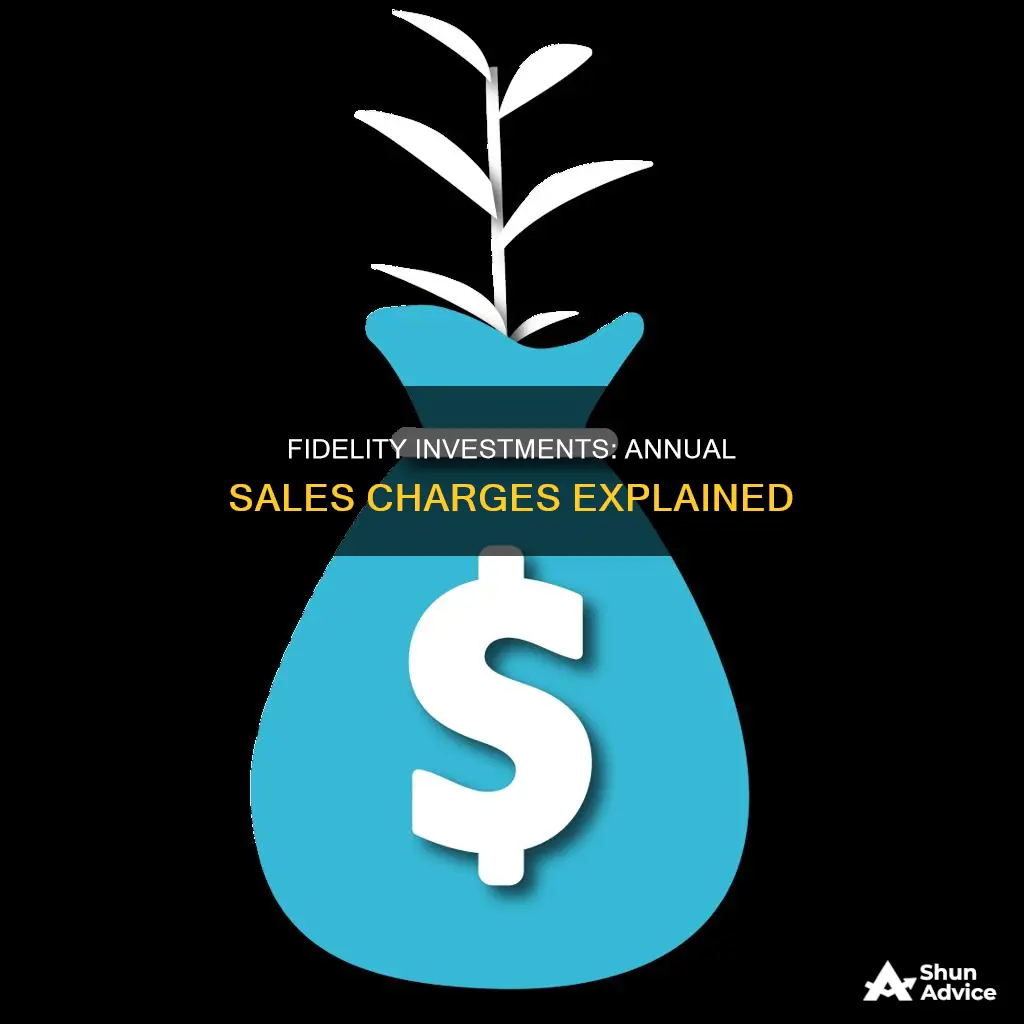
Fidelity Investments is a well-rounded brokerage firm that offers a range of investment options, including stocks, bonds, mutual funds, and ETFs. While they eliminated commissions in 2019 for US stock, ETF, and options trades, they still charge a $0.65 per-contract fee for options trades, which is relatively high compared to other brokers.
Fidelity has a strong reputation for its mutual funds and offers a large selection of no-transaction-fee funds, including its Fidelity Zero index funds, which have no expense ratio and no minimum investment requirement.
When it comes to sales charges, Fidelity offers different options:
- No Load Sales Charge Option: Funds are sold without a fee being charged at the time of sale.
- Initial Sales Charge Option: A sales charge is paid when purchasing the fund, and the amount is negotiable with the advisor.
- Deferred Sales Charge Option: A fixed sales charge based on the original cost of the funds is paid if redeemed within a certain period (usually six years).
- Low Load Deferred Sales Charge Option: Similar to the previous option, but the charge is applied if funds are redeemed within two years of purchase.
Fidelity also offers fee-based series, where investors pay their dealer or discount broker a fee for investment advice, administration, and management services instead of sales charges.
Overall, Fidelity provides a comprehensive range of investment options with competitive fees and a strong reputation for mutual funds, making it a good choice for both active traders and beginner retirement investors.
| Characteristics | Values |
|---|---|
| Sales charges | Commissions |
| Sales charge types | Initial, Deferred, Low Load, Low Load 2, No Load, Fee-based |
| Initial sales charge | Payable at the time of purchase, negotiable with the advisor |
| Deferred sales charge | Payable when redeeming funds, calculated as a percentage of the original cost of the funds |
| Low Load deferred sales charge | Applicable if funds are redeemed within two years of purchase |
| Low Load 2 deferred sales charge | Applicable if funds are redeemed within three years of purchase |
| No Load sales charge | No fee charged at the time of sale |
| Fee-based sales charge | Investors pay a fee for investment advice and/or administration and management services |
What You'll Learn

No annual account fees
Fidelity Investments is a well-rounded brokerage with no annual account fees and no minimums to open a retail brokerage account. This means that investors can open an account without any initial capital, and there are no recurring costs to maintain an account.
Fidelity offers commission-free trades on online US stock, ETF, and option trades. The company also provides a range of no-expense-ratio index funds, giving investors a wide variety of options to build a balanced and cost-effective portfolio.
Fidelity's mutual funds, particularly the no-transaction-fee funds, are highly regarded. The company offers a large selection of these funds, including the Fidelity Zero index funds, which carry no expense ratio and no minimum investment requirement. This means that investors can purchase these funds without paying any additional fees, and there is no minimum amount that must be invested.
In addition to its extensive investment options, Fidelity also provides robust educational resources and research tools for investors of all levels, from beginners to active traders. The company's trading platforms, Fidelity.com and Active Trader Pro, offer advanced screeners, research, and strategy-testing tools based on ten years of historical data.
Fidelity's mobile app is highly rated and includes real-time quotes, multi-leg options trading, and a consolidated version of the company's research offerings. The app also allows users to schedule appointments with their Fidelity advisors and provides educational resources for investors.
Overall, Fidelity's lack of annual account fees, combined with its extensive investment options, educational resources, and user-friendly platforms, make it a compelling choice for investors.
Investing in Index Funds: A Minor's Guide
You may want to see also

No minimum investment
Fidelity offers no-minimum-investment mutual funds, which means that investors can allocate their money across a wide range of stocks and other securities without having to meet a minimum threshold. This is a great option for those who are just starting out with investing or those who want to diversify their portfolio without committing a large sum of money upfront.
Fidelity's no-minimum-investment options include the following:
- Fidelity ZERO Large Cap Index Fund (FNILX): This fund seeks to provide investment results that correspond to the total return of a broad range of large-capitalization US companies. It has a 0% expense ratio and no minimum investment.
- Fidelity ZERO Extended Market Index Fund (FZIPX): This fund seeks to provide investment results that correspond to the total return of a broad range of mid- to small-capitalization US companies. It also features a 0% expense ratio and no minimum investment.
- Fidelity ZERO Total Market Index Fund (FZROX): This fund aims to provide investment results that mirror the performance of a broad range of publicly traded companies in the US. Again, it has a 0% expense ratio and no minimum investment.
- Fidelity ZERO International Index Fund (FZILX): This fund seeks to provide investment results that correspond to the total return of foreign developed and emerging stocks. It has a 0% expense ratio and no minimum investment, making it a great option for those looking to invest in international markets.
In addition to these no-minimum-investment mutual funds, Fidelity also offers no minimums to open a retail brokerage account, including IRAs. This means that investors can start investing with Fidelity without having to commit a large sum of money upfront. With no account fees and commission-free trades, Fidelity provides a cost-effective way to start building an investment portfolio.
It's important to note that while there are no minimums to open an account or invest in the above-mentioned funds, there may still be other fees associated with investing, such as management fees, transaction fees, or commissions. Be sure to review the fund prospectus and fee schedule to understand all the costs involved.
Invest in HDFC Property Fund: A Comprehensive Guide
You may want to see also

Zero expense ratio index funds
Fidelity offers zero expense ratio index mutual funds, which means that investors do not have to pay any fees for investing in these funds. These funds are:
- Fidelity® ZERO Total Market Index Fund (FZROX)
- Fidelity® ZERO International Index Fund (FZILX)
- Fidelity® ZERO Extended Market Index Fund (FZIPX)
- Fidelity® ZERO Large Cap Index Fund (FNILX)
These funds are only available to individual retail investors who purchase their shares through a Fidelity brokerage account. They are not available in employer plans (401k, etc.).
Fidelity also offers other funds with low expense ratios, such as the Fidelity® Total Market Index Fund (FSKAX), which has an expense ratio of 0.03% as of March 1, 2019.
Despite these considerations, zero expense ratio index funds can be a great option for investors looking for a broadly diversified index fund at a low cost.
Date Fund Investment: How and When to Invest
You may want to see also

Commission-free trades
Fidelity offers commission-free trades for online US stock, ETF, and option trades. This means that there is no fee for buying stocks, ETFs, and options, but there is a $0.65 per-contract charge for options trades. There is also an activity assessment fee for sell orders, which is typically between $0.01 and $0.03 per $1,000 of principal.
Fidelity also offers commission-free trades for US Treasury bonds traded online, and a range of no-expense-ratio index funds. These include the Fidelity ZERO Total Market Index Fund, the Fidelity ZERO International Index Fund, the Fidelity ZERO Large Cap Index Fund, and the Fidelity ZERO Extended Market Index Fund. These funds have no expense ratio and no minimum investment requirement, making them a great option for investors looking to build a low-cost retirement portfolio.
In addition to commission-free trades, Fidelity offers a range of other features that make it a well-rounded brokerage option. It provides a large selection of no-transaction-fee mutual funds, top-notch research tools, and a highly-rated mobile app. It also has a strong reputation for customer service, with 24/7 phone, email, and chat support, as well as a network of over 200 branches for in-person advice.
Fidelity's fee structure is transparent, and the company has eliminated most account fees, including transfer and account closure fees. It also offers a high interest rate on uninvested cash, with a seven-day yield of over 4% at the time of this review.
Overall, Fidelity's commission-free trades and low fees make it a great choice for investors, whether they are just starting out or are more experienced traders.
Best Accounts to Invest in Mutual Funds
You may want to see also

Low-cost investment options
There are a variety of low-cost investment options available, which can be a great way to get started in investing without requiring a lot of money upfront. Here are some options to consider:
- Robo-advisors: Robo-advisors, such as Betterment and Wealthfront, use algorithms to build and manage a diversified, low-cost portfolio of index funds, mutual funds, and/or bond funds based on your investment goals and risk tolerance. They typically have low minimum balance requirements and charge modest fees based on the size of your account.
- Fractional Shares: Some investing platforms, like Robinhood, allow you to purchase fractional shares of stocks, meaning you can invest in a company for just a few dollars. This enables you to diversify your portfolio without needing a large amount of capital.
- Index Funds and Mutual Funds: Index funds and mutual funds are "baskets" of stocks or bonds that you can invest in with a single transaction. Index funds are passively managed and follow a specific index, like the S&P 500, while mutual funds are actively managed and follow a set of objectives. Mutual funds often have high minimum investment requirements, but some companies waive these with automatic investments or have no minimum at all. Index funds generally have lower fees than mutual funds.
- Exchange-Traded Funds (ETFs): ETFs are similar to mutual funds but trade like stocks on an exchange and tend to be more liquid. They hold a collection of stocks, bonds, or commodities and usually have no minimum investment requirement.
- Real Estate Crowdfunding: Platforms like Fundrise allow you to invest in real estate projects with a minimum investment of just $10. You can choose specific projects to invest in or let the platform select ideal investments for you. This option provides access to real estate without the hassle of being a landlord.
- Certificate of Deposit (CD): A CD is a low-risk investment where you deposit your money for a specific period in exchange for a guaranteed return, regardless of interest rate changes. The longer the duration, the higher the interest rate. CDs are available at banks and are FDIC-insured up to $250,000.
- Money Market Account: A money market account is a type of mutual fund that aims to protect the principal investment while providing a small amount of interest. It tries to maintain a Net Asset Value (NAV) of $1 per share and, while not foolproof, has a strong pedigree in protecting the underlying value.
- Treasury Inflation-Protected Securities (TIPS): TIPS are a type of low-risk bond offered by the US Treasury. They provide a fixed interest rate that doesn't change and built-in inflation protection guaranteed by the government. Your investment value will rise with the inflation rate during the holding period.
- High-Interest Savings Accounts: These accounts offer competitive interest rates, allowing you to earn interest on your deposited money with minimal effort. Look for accounts with no fees, excellent customer service, competitive rates, and no account minimums or deposit requirements.
- Credit Card Rewards: Using cashback credit cards can help you earn rewards or points on your regular spending, which can be more lucrative than some low-risk investments.
- US Treasury Securities: These are debt obligations issued by the US Treasury Department with maturities ranging from 30 days to 30 years. You can invest in these securities through the Treasury Direct portal with denominations as low as $100, and there are no early withdrawal penalties.
Remember to do your research and understand the risks and fees associated with each investment option before committing your money.
A Guide to Investing in India's Money Market Mutual Funds
You may want to see also
Frequently asked questions
There are several types of sales charges, including:
- No Load sales charge option: Funds are sold without a fee being charged at the time of sale.
- Initial Sales Charge option: You may pay a sales charge when you buy the series of the Fund.
- Deferred Sales Charge option: If funds are redeemed within six years of purchase, a fixed sales charge is applied.
- Low Load deferred sales charge option: If funds are redeemed within two years of purchase, a fixed sales charge is applied.
- Low Load 2 deferred sales charge option: If funds are redeemed within three years of purchase, a fixed sales charge is applied.
Fidelity offers commission-free trades for online US stocks, ETFs, and options. There is also a small charge on sell orders, as they are subject to an activity assessment fee of $0.01-$0.03 per $1,000 of principal.
There are no inactivity fees, even if you leave your account idle for a long time. There are also no withdrawal fees for ACH and USD wire withdrawals. However, non-USD wire withdrawals cost 3% of the amount withdrawn.







